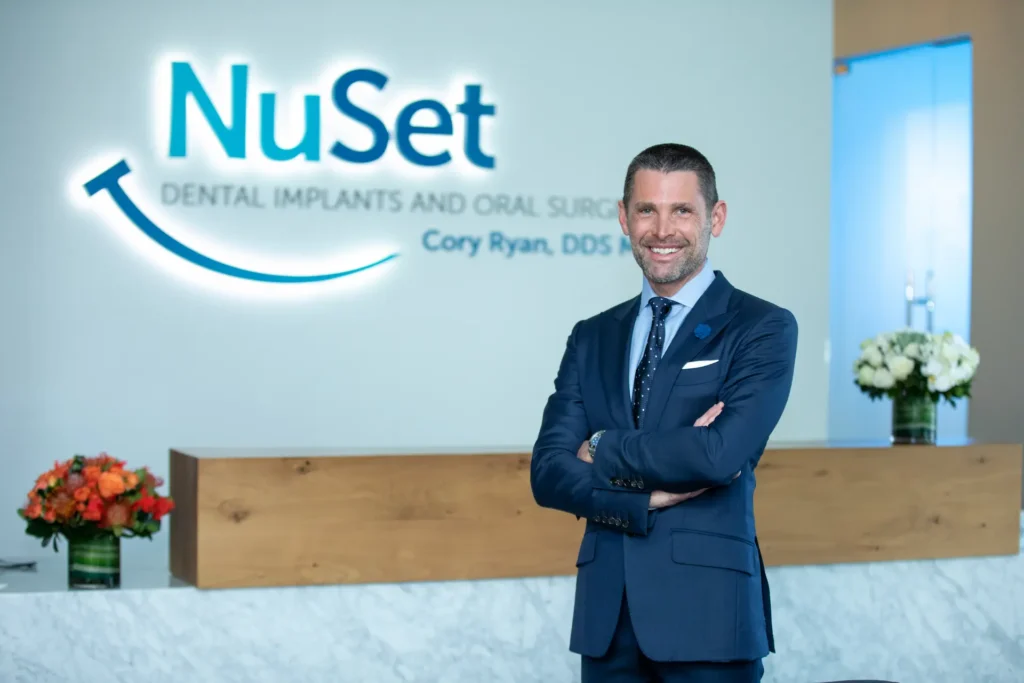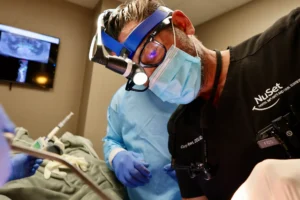Are you getting dental implants soon, or do you already have dental implants? If so, you’re probably excited to have a full smile and enjoy your favorite foods again. But you might also have questions about recovery.
After surgery, your dental implant specialist will give you clear instructions to help you heal. But do you know what to avoid after dental implant surgery? Avoiding certain habits is just as important as following the right steps. The amazing thing is that dental implants have a success rate of over 95%, and proper aftercare can help ensure your implants last a lifetime.
At NuSet Dental Implant and Oral Surgery, we make sure you get the support you need. Our team provides expert care before, during, and after your implant procedure. Let’s discuss what to avoid after surgery and what you can do instead to heal properly.
Key Takeaways
- Avoid touching the implant site after dental implant surgery to prevent infection.
- Eat soft foods to avoid placing pressure on the implant site.
- Keep your mouth clean, but be gentle when brushing.
- Rest and avoid heavy exercise in the first few days.
What to Avoid Immediately After Dental Implant Surgery
The first few days after your surgery are very important. Your body is working to heal, and what you do during this time can make a big difference. To protect your implant and avoid complications, here’s what you shouldn’t do.
Don’t Touch or Poke the Implant Area
While it may be tempting to check on the implant with your tongue or fingers, this can introduce bacteria and disturb healing. If you feel swelling or discomfort, use a cold compress on your cheek instead of touching the implant directly.
Don’t Smoke or Use Tobacco
Smoking is one of the worst things you can do after surgery. Studies shot it reduces blood flow, slows healing, and increases the risk of implant failure. If you smoke, try to quit or at least avoid smoking for a few weeks after surgery.
Don’t Eat Hot Foods or Drink Hot Beverages
Hot foods and drinks can irritate the implant site and cause discomfort, so stick to lukewarm or cold meals and room temperature drinks in the first few days.
Don’t Eat Hard, Crunchy, or Sticky Foods
Your implant is still healing, and chewing hard foods can put too much pressure on it. Avoid nuts, chips, raw vegetables, and sticky candies. Instead, go for soft foods like soft (mashed) potatoes, scrambled eggs, yogurt, and smoothies during the first few days.
Don’t Do Strenuous Physical Activity
Heavy lifting, running, or intense exercise can increase blood flow to the head, leading to swelling, bleeding, and discomfort. Take it easy for at least 48 hours after surgery. Gentle walking and easy movement should be fine.
Don’t Use Straws
Sipping through a straw creates suction in your mouth, which can dislodge the blood clot protecting the surgical area. This can lead to a dry socket, a painful condition that delays healing. Drink directly from a cup instead.
Avoiding these mistakes will help prevent pain, infection, and complications.
What to Avoid in the Long-Term (During the Recovery Period)
Your implant is healing, and there are some things you can do to help support your body and teeth during this recovery period.
Don’t Skip Oral Hygiene, But Be Gentle
Keeping your mouth clean is important, but brushing too hard can irritate the implant site. Avoid using an electric toothbrush near the area at first. Instead, use a soft-bristled toothbrush and gentle strokes. A waterpik is a dental implant’s best friend, so make sure to make use of these.
Mouthwash with alcohol can also dry out the tissues and slow healing. Stick to lukewarm rinses or an alcohol-free antimicrobial rinse as recommended by your dentist.
Don’t Chew Directly on the Implant Site
Your implant isn’t fully fused with the bone yet. Putting too much pressure on it too soon can cause pain or even shift the implant.
If you’re eating something firmer, cut it into smaller pieces to make chewing easier. This reduces strain on your implant and keeps it safe while healing.
Don’t Drink Alcohol Too Soon
Alcohol can slow down healing and interfere with medications, especially antibiotics and pain relievers. Even after the first few days, drinking alcohol can dry out your mouth, increasing the risk of infection.
What to Do Instead – Proactive Tips for a Smooth Recovery
Now that you know what to avoid, let’s focus on what you should do to heal faster and keep your implant safe.
Follow Your Dental Implant Specialist’s Instructions
Every patient heals differently. Your dental specialist will give you personalized aftercare instructions based on your specific case. Follow them closely. If you’re unsure about something, don’t guess—ask your specialist. Staying on track with their advice will help prevent complications.
Manage Swelling and Pain the Right Way
Slight swelling is a sign of inflammation, which is a sign that your body is busy healing- even if it causes a little discomfort. Here’s how you can manage the discomfort while supporting your healing:
- Use ice packs on your cheek for the first 24 hours (15 minutes on, 15 minutes off). This helps reduce swelling.
- Take pain medications as prescribed—don’t wait until the pain gets worse.
- Sleep with your head slightly elevated for the first few nights to minimize swelling.
Stay Hydrated and Eat Soft, Nutritious Foods
Drinking plenty of water helps your body heal faster and keeps your mouth clean. Avoid sugary drinks and stick to water for the best results.
For food, choose soft, nutritious meals like:
- Scrambled eggs
- Mashed potatoes
- Yogurt
- Smoothies
- Soft fish
- Oatmeal
These foods give your body the nutrients it needs without putting pressure on your implant.
Practice Gentle Oral Hygiene
Keeping your mouth clean ensures your dental implant site heals with ease. But remember, be gentle.
- Brush gently with a soft-bristled toothbrush. Avoid ‘scrubbing’ near the implant.
- Use a warm water rinse (after the first 24 hours) to clean your mouth without irritation.
- Use waterpik for flossing.
Your body needs energy to recover. Try to rest as much as possible, especially in the first few days. Avoid stressful activities and get plenty of sleep.
If you take it easy and follow these steps, you’ll speed up healing and lower your risk of complications.
Protect Your Implant and Heal Faster with Expert Care

Taking care of your dental implant after surgery is the key to a smooth recovery. Avoiding the wrong habits and following your dentist’s advice will help your implant heal properly and last a lifetime.
Remember to protect the implant site, eat soft foods, keep your mouth clean, and rest. If you notice anything unusual—pain, swelling, bleeding, or a loose implant—call us at NuSet Dental Implant and Oral Surgery right away.
Our team is here to support you every step of the way. If you have questions or need a follow-up appointment, contact us now.
Frequently Asked Questions
What are the dos and don’ts after dental implant surgery?
Do’s:
- Follow your specialist’s aftercare instructions.
- Keep the implant site clean with gentle brushing, flossing with a waterpik, and rinsing.
- Eat soft and nutritious foods.
- Stay hydrated and drink plenty of water.
- Use ice packs to reduce swelling.
- Rest and avoid strenuous activities.
Don’ts:
- Don’t touch or poke the implant site.
- Don’t smoke or drink alcohol, as they can slow healing.
- Don’t eat hard, crunchy, or sticky foods.
- Don’t use straws, as they can disturb the surgical site.
- Don’t skip follow-up appointments.
How long after a dental implant can I eat normally?
Most people can start eating soft foods within the first 24 hours after surgery.
What foods cannot be eaten with dental implants?
You should avoid eating hard, crunchy and chewy foods after dental implant surgery.
Can I eat eggs after dental implant surgery?
Yes! Eggs are soft, easy to chew, and packed with protein, which helps with healing. Scrambled eggs, omelets, and poached eggs are all great choices.





